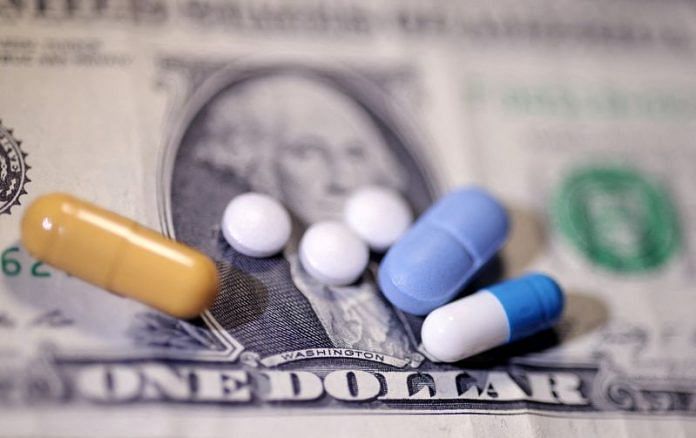By Patrick Wingrove and Trevor Hunnicutt
WASHINGTON (Reuters) – The U.S. government will save $6 billion in the first year from new prices the Biden administration has negotiated down by as much as 79% on 10 top-selling prescription drugs for the Medicare health program for older Americans, officials said on Thursday.
President Joe Biden’s signature Inflation Reduction Act, signed into law in 2022, allows Medicare to negotiate prices for some of the most costly drugs that the program covers for 66 million people.
The new prices will go into effect in 2026. They represent cuts to individual list prices that do not reflect any rebates and discounts the government may already have been getting for the drugs, although the government’s estimated savings from the negotiations do take those discounts into account.
Merck & Co’s diabetes drug Januvia faces the steepest percentage price cut of the drugs on the list, decreasing 79%, and the prices of Novo Nordisk’s insulin aspart products will be slashed by 76%, according to the government.
The other eight drugs on the list face cuts of between 68% and 38%.
The administration said people covered by Medicare, which mostly serves Americans aged 65 and over, would also save $1.5 billion in out-of-pocket costs for the prescription medicines in 2026. They include widely used diabetes treatments Januvia and Jardiance, blood thinners Eliquis and Xarelto and leukemia drug Imbruvica.
The officials did not provide further detail on the new prices or say why the full $6 billion in savings would not be passed to patients.
Bristol Myers Squibb, which makes the bloodthinner Eliquis, said the 56% price cut to its drug would not solve the “biggest problem in patient affordability” of out-of-pocket costs that are determined by health insurers and pharmacy benefit managers.
Pharmacy benefit managers are companies that handle prescription drug benefits for health insurance companies, large employers, and Medicare prescription drug plans. They negotiate fees and volume-based discounts, known as rebates, on their behalf of payers with drugmakers and pharmacies.
Johnson & Johnson, whose Crohn’s disease medicine Stelara and bloodthinner Xarelto face list price cuts of 66% and 62% respectively, also said patients would face higher costs as a result of the price cuts.
The Democratic-run administration hopes the cost savings will ease Americans’ anger about high prices, an issue they frequently say is their top concern headed into the closely contested Nov. 5 presidential election between Democratic Vice President Kamala Harris and Republican former President Donald Trump.
“Every American should be able to access the health care they need no matter their income or wealth,” said Harris, who is holding events this week on her plans to cut costs.
Harris’ tie-breaking Senate vote passed the law that allows for the drug-price negotiations, which no Republicans supported. In a statement, she also pointed to her work as California attorney general holding “big pharma accountable for their deceptive and illegal practices.”
PRICE PAIN
More than half of voters in 2020 were over the age of 50, and healthcare consumes about 8% of Americans’ spending, according to Pew Research Center and Labor Department data.
Inflation has ebbed, but higher prices since the COVID pandemic have left consumers smarting. Consumer prices rose 2.9% over the 12 months through July, and the category including prescription drugs gained roughly the same percentage.
U.S. health secretary Xavier Becerra characterized the negotiations with drugmakers as comprehensive and intense.
“After substantial back and forth, either we accepted an offer or a company accepted our offer,” he said.
The Medicare agency said it accepted revised counteroffers proposed by the drug manufacturers for four of the 10 selected drugs, while drugs companies accepted its final offer on five.
The administration released its list of the 10 costliest drugs to Medicare that would be subject to negotiations last year, with AbbVie’s cancer drug Imbruvica among them.
Other medicines picked for negotiations included Amgen’s rheumatoid arthritis treatment Enbrel and Boehringer Ingelheim and Eli Lilly’s Jardiance.
The pharmaceuticals industry has fought hard to block the Medicare negotiations, with several companies suing the administration and warning that they may have to curtail some drug development programs as a result.
Several of these drugmakers last month said they did not expect a significant impact on their businesses after seeing confidential prices from the government for their drugs that will take effect in 2026.
The next round of Medicare drug price talks are expected to include 15 further drugs and begin in February.
(Reporting by Patrick Wingrove and Trevor Hunnicutt; Editing by Stephen Coates, Chizu Nomiyama and Nick Zieminski)
Disclaimer: This report is auto generated from the Reuters news service. ThePrint holds no responsibilty for its content.



